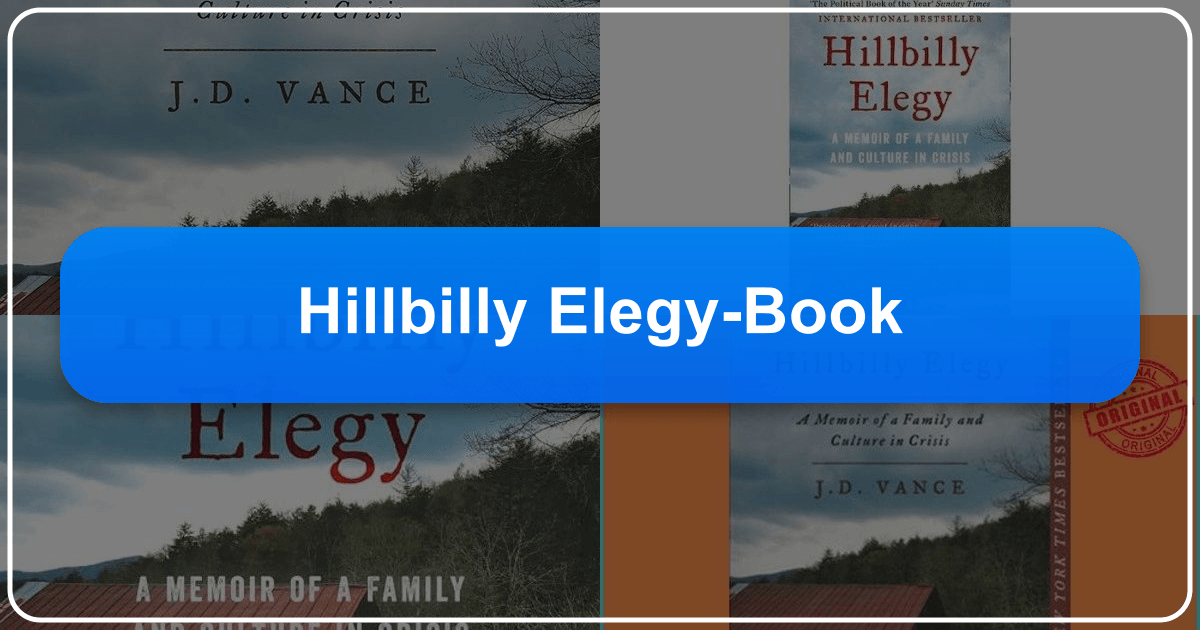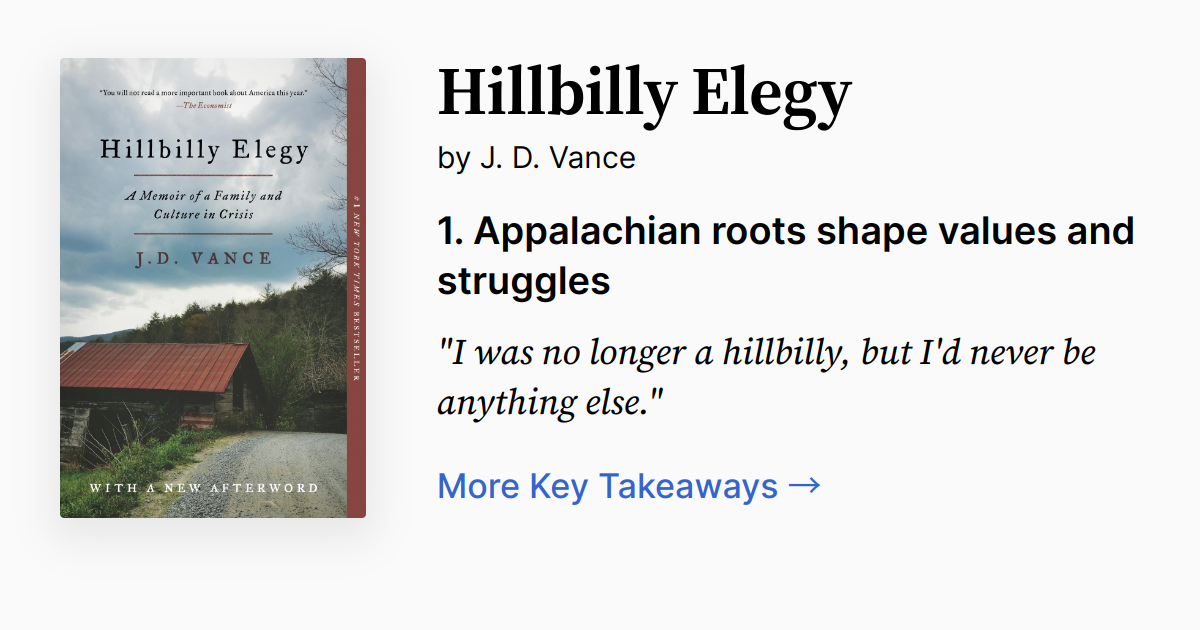Hillbilly Elegy: A Deep Dive into J.D. Vance's Memoir

J.D. Vance’s “Hillbilly Elegy: A Memoir of a Family and Culture in Crisis” is more than just a personal story; it’s a poignant exploration of the struggles faced by America’s white working class, offering a raw and intimate perspective on poverty, addiction, and the erosion of the American dream. This in-depth analysis will examine the book’s themes through the lens of various aspects, from its genre and literary influence to its cultural impact and the author’s background. We will explore the book’s content, its critical reception, and its lasting significance in understanding contemporary social issues.

The Book: Genre, Reception, and Themes
“Hillbilly Elegy” defies easy categorization. While fundamentally a memoir, recounting Vance’s personal experiences growing up in Appalachian Ohio, it transcends the purely autobiographical. The narrative seamlessly blends personal reflections with astute sociological observations, creating a powerful blend of memoir and social commentary. This unique approach contributes to the book’s enduring relevance and critical acclaim.
The book resonated deeply with a wide audience, achieving bestseller status and generating extensive media coverage and public discussion. Its success stems from Vance’s compelling storytelling, his willingness to confront uncomfortable truths about his own family’s struggles and the broader societal forces at play, and the timeliness of its themes in a politically and socially fractured America. While praised for its honesty and insightful commentary, the book also faced criticism for its generalizations about Appalachia and the working class.
Central to the narrative is the cyclical nature of poverty and dysfunction within Vance’s family. He vividly portrays the impact of generational trauma, addiction, and the lack of social support systems on individual lives and family relationships. The narrative isn’t merely a catalog of hardship; it explores the complex interplay of cultural factors, economic realities, and personal choices that contribute to the cycle of poverty. Vance doesn’t shy away from the difficult aspects of his upbringing, depicting moments of violence, neglect, and instability with unflinching honesty. However, it’s balanced by moments of warmth, humor, and resilience that highlight the strength and resourcefulness of individuals within his community.

The book also examines the cultural values and beliefs prevalent within the white working class, including its strong sense of family loyalty, its reliance on individual grit and determination, and its skepticism towards government intervention. Vance’s observations regarding these cultural factors provide a nuanced understanding of the challenges faced by individuals who feel disconnected from mainstream society and its institutions.
J.D. Vance: Author, Background, and Writing Style
J.D. Vance’s personal journey is as compelling as the story he tells in “Hillbilly Elegy.” His background—growing up in poverty, serving in the Marine Corps, and subsequently graduating from Yale Law School—provides him with a unique perspective that informs his writing. This personal experience allows him to bridge the gap between academic analysis and lived reality, creating a more relatable and compelling narrative.
Vance’s writing style is characterized by a direct and accessible tone. He eschews academic jargon, opting for clear and concise language that allows the reader to connect easily with his experiences and observations. His narrative voice is personal and vulnerable, conveying both the hardship he endured and the lessons he learned. The book’s impact hinges on Vance’s ability to make complex sociological issues accessible and relatable, drawing readers into the emotional heart of his story.

Reading and Learning from “Hillbilly Elegy”
Reading “Hillbilly Elegy” offers a valuable educational experience, extending far beyond a simple understanding of Vance’s life story. The book serves as a powerful case study in the complex dynamics of poverty, addiction, and social mobility. The book’s most significant contribution may be its illumination of the complex interplay of individual agency and systemic factors. Vance makes clear that while personal responsibility is paramount, systemic issues, including lack of education, employment, and resources, deeply impact the chances of individuals escaping cycles of poverty. The book’s emphasis on the need for both individual effort and societal support serves as a crucial framework for discussions of social justice and economic development.
Readers can extract several significant life lessons from Vance’s narrative. The importance of strong family ties, the power of education as a tool for social mobility, and the necessity of personal resilience in overcoming adversity are all prominent themes. Perhaps most importantly, “Hillbilly Elegy” underscores the need for empathy and understanding in addressing societal issues. By providing an intimate and relatable narrative, Vance encourages readers to connect with those from different backgrounds and engage with complex social issues in a less judgmental manner.
Cultural Impact and Legacy
“Hillbilly Elegy” has made a considerable impact on American culture and the national conversation about class and social mobility. Its publication sparked widespread discussion of the challenges faced by the white working class, generating debates on political policies, economic inequality, and the state of the American dream. It has influenced the conversation around social mobility and the factors that contribute to or hinder its attainment.
While generating heated discussions, the book’s legacy also extends to influencing policy discussions and inspiring various initiatives aimed at supporting the white working class. Its lasting impact lies in its contribution to the national dialogue on these important social issues. The book has also inspired discussions about the importance of cultural awareness and empathy in bridging societal divides and promoting social cohesion.
Beyond the Book: Further Exploration
While “Hillbilly Elegy” provides a crucial starting point, further exploration of the issues it raises is vital. Researching the history of Appalachia, examining economic trends in the Rust Belt, and exploring social programs aimed at addressing poverty can deepen our understanding of the complexities depicted in the book. Seeking out other firsthand accounts and perspectives from individuals within the white working class will enrich our understanding of the subject. By engaging with the broader context surrounding “Hillbilly Elegy,” we can move towards more informed and effective strategies to promote social justice and opportunity for all.
In conclusion, “Hillbilly Elegy” stands as a significant work of contemporary literature. Its blend of personal memoir and social commentary has resonated deeply with readers and continues to shape the national conversation around critical social issues. Though sparking debate, its contribution to raising awareness and promoting empathy surrounding the challenges of the white working class remains its enduring legacy.